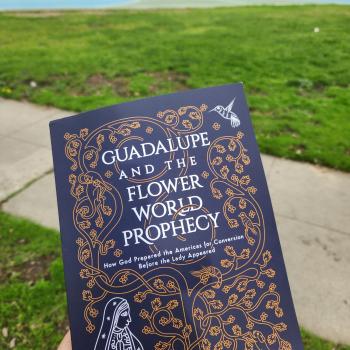Suppose you're a math whiz and it's perfectly apparent to you why the sum of the interior angles of a triangle is 180 degrees. You can do the proof step-by-step, giving you certain knowledge based on reason and logic.
But suppose you have a friend named Bill who's talented in many areas, but not in math. He can't follow the proofs you lay out, but he believes you—not because he's proven it, but because he has faith in you, his trustworthy friend, the math wizard.
In a sense, Bill is sharing in your own way of knowing even though it's a bit beyond him.
It certainly also involves a relationship with God, but faith is first of all a gift of knowing, through grace. Like geometry, faith involves knowing certain things. We don't believe because we've gone through a rigorous process of proving truth after truth, but because we know and love God.
But how do we know it? St. Thomas talks of the "formal object" of faith: We know because of God. Our faith is in God himself and it rests on the truthfulness of God. Just as math-anxious Bill shares in your knowing, by faith we share in God's own knowing. That is, God has revealed himself through his deeds and words in salvation history, and through that revelation we know some truth about God.
That's not to say that faith has nothing to do with reason. It is reasonable to believe, as Pope John Paul explored in his encyclical Fides et Ratio.
The point here is that faith is a theological virtue because it is rooted directly in God. To God, even the deepest mysteries of our faith, such as the Incarnation and the Trinity, are self-evident, but they're not self-evident to us. We're like Bill, who can't quite follow the reasoning of geometry. But because we know and trust God, we can know something about these mysteries because God has revealed them to us, through Jesus Christ. Though faith is reasonable, it is not the product of human thought. We do not, as it were, build on faith the way we build on geometry.
Sometimes you may hear people say, "I'm Catholic, but I don't agree with X, Y, or Z teaching of the Church." This approach is referred to sometimes as "cafeteria Catholicism," in the sense that the teaching of the Catholic Church is like a giant cafeteria. Someone might go in and say, "I'll go for the Incarnation and the Trinity, but not the sacraments." Someone else might say, "I'll take the sacraments, but hold confession." This can only happen when we treat matters of faith as if faith were geometry, as if the Catholic faith is purely a construct of human reasoning.
But faith goes beyond human reasoning, to the point where we can only fall down on our knees and say, "Lord, I believe, help my unbelief." That's why Cardinal Newman could say that a thousand difficulties do not make one doubt. Even if some teaching doesn't seem to make sense to us, we can still believe because we know the One who revealed it, and he is trustworthy.
We should make every effort to better understand our faith. But if we reject Church teaching because we don't understand something, in effect we are making our own puny minds the arbiter of all truth. We're treating faith as if the reason we believe is because we can completely understand what God has revealed, like geometric proofs.
But consider how Peter and the other apostles came to believe; they got to know Jesus. They traveled with him, heard him preach, asked him questions, and saw him pray. They knew him. Then one day, at Capernaum, Jesus said something that a lot of people thought was crazy: "Unless you eat my flesh and drink my blood, you cannot have life in you."
Many people left Jesus that day; it was just too much for them. Jesus turned to Peter and asked him, "Are you going to go away too?" Peter replied, "Lord, to whom shall we go? You have the words of eternal life. We have come to believe and are convinced that you are the Holy One of God" (Jn. 6:67-69).
Peter stayed with Jesus even though it seemed crazy, because Peter understood that Jesus wasn't teaching a set of geometry theorems based solely on human reason. Jesus was teaching something deeper, and he could guarantee its truth because God was behind it. That's the ultimate reason we believe.
So skip the cafeteria and head to the eternal banquet.
12/2/2022 9:05:39 PM




